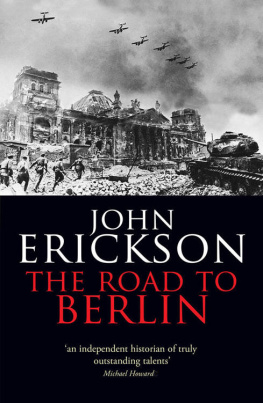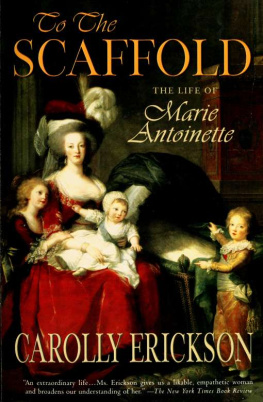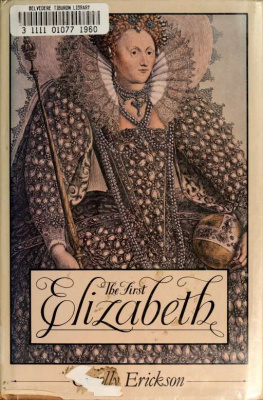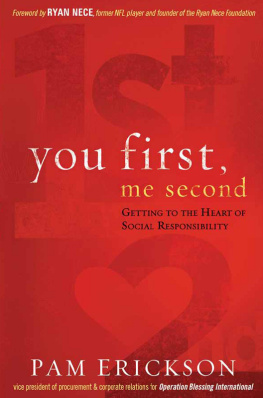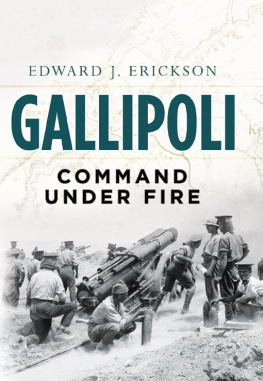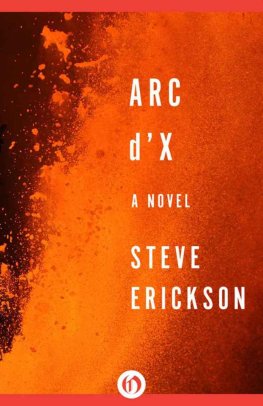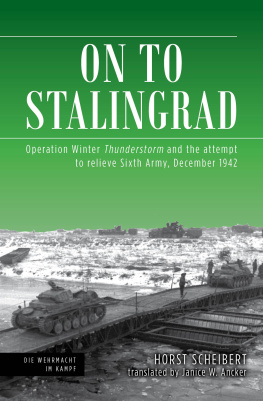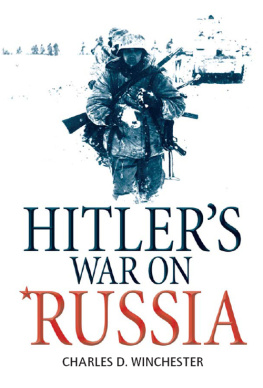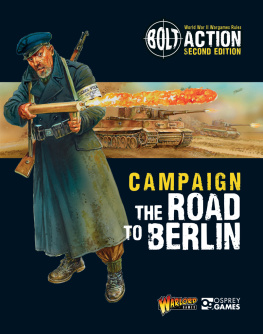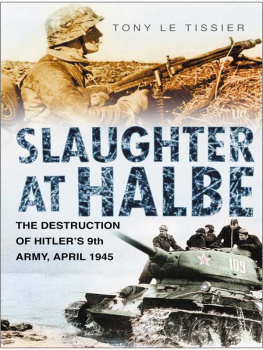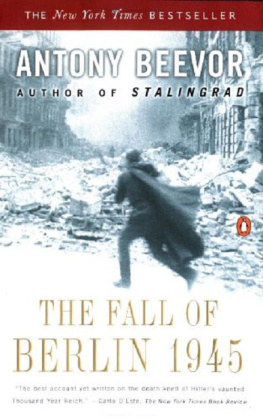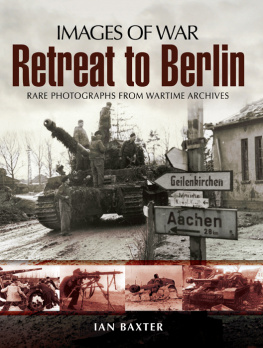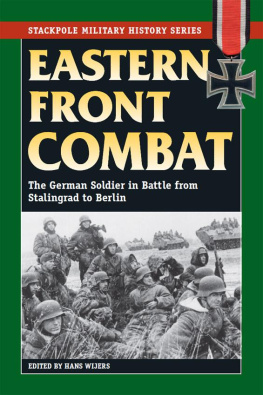Erickson - Road To Berlin 1ST Edition
Here you can read online Erickson - Road To Berlin 1ST Edition full text of the book (entire story) in english for free. Download pdf and epub, get meaning, cover and reviews about this ebook. year: 2015, publisher: Orion, genre: Science. Description of the work, (preface) as well as reviews are available. Best literature library LitArk.com created for fans of good reading and offers a wide selection of genres:
Romance novel
Science fiction
Adventure
Detective
Science
History
Home and family
Prose
Art
Politics
Computer
Non-fiction
Religion
Business
Children
Humor
Choose a favorite category and find really read worthwhile books. Enjoy immersion in the world of imagination, feel the emotions of the characters or learn something new for yourself, make an fascinating discovery.
Road To Berlin 1ST Edition: summary, description and annotation
We offer to read an annotation, description, summary or preface (depends on what the author of the book "Road To Berlin 1ST Edition" wrote himself). If you haven't found the necessary information about the book — write in the comments, we will try to find it.
Road To Berlin 1ST Edition — read online for free the complete book (whole text) full work
Below is the text of the book, divided by pages. System saving the place of the last page read, allows you to conveniently read the book "Road To Berlin 1ST Edition" online for free, without having to search again every time where you left off. Put a bookmark, and you can go to the page where you finished reading at any time.
Font size:
Interval:
Bookmark:
The Road to Berlin
Stalins War with Germany
Volume Two
JOHN ERICKSON

To my late father Harry who gave his utmost and my father-in-law Branko who gave his life, fighting for the cause of all good men:
Smrt faizmu, sloboda narodu.

Contents



Note on abbreviations
The following abbreviations have been used in the maps. For the Soviet side: A = Army, ShA = Shock Army, TA = Tank Army, GA = Guards Army, GTA = Guards Tank Army, AA = Air Army, PolA = Polish Army, RA = Rumanian Army, CavMechGp = Cavalry Mechanized Group, MechC = Mechanized Corps.
On the German side, roman numerals in bold type have been used for the Armies. Thus, for example, IX A = Ninth Army, II PzA = Second Panzer Army, etc.


Not very long ago a Soviet colleague, remarking on The Road to Stalingrad which preceded this present study, wagged an admonitory finger in my direction, deploring and disparaging any talk of Stalins war with Germany. The Great Patriotic War, which lasted from 22 June 1941 to 9 May 1945 and spanned 1,418 days, could not and should not, he said, be so personalized. On the contrary, it was the saga of the Soviet people and a fiery vindication of the resilience of the Soviet state, a record of sacrifice and achievement (coupled with the exertions of the Communist Party) whereby the burden of this, the most gruelling of all wars, was carried through to a triumphant end. The record speaks for itself. In the course of 1,320 days of active military operations (93 per cent of the entire wartime period) the Red Army destroyed or disabled 506.5 German divisions in the east, while Germanys sullen satellites lost a further 100 divisions as the price of participating in the war against the Soviet Union. Out of the grand total of Germanys losses of 13,600,000 killed, wounded, missing and made prisoner, Soviet military statisticians reckon that no less than 10,000,000 men met a grim fate on the Eastern Front.
The horrendous carnage was also accompanied by a mighty clash of war machines, the Red Army claiming the battlefield destruction of 48,000 enemy tanks, 167,000 guns and almost 77,000 aircraft, while Soviet war industry, having carried through the greatest enforced industrial migration in history, furnished the battlefronts with no less than 78,000 tanks and 16,000 self-propelled guns, 108,028 combat aircraft, 12 million rifles and carbines, 6 million sub-machineguns, almost 98,000 field guns and 110,000 lorries. By these demonstrations, whatever the scale of measurement, the decisive role in defeating the Fascist bloc was played by the Soviet Union. Superiority over the enemy was finally attained but this was no mere matter of numbers, for true superiority lay in Soviet economic performance, in the Soviet political system and in the ideology of socialist society, with the Communist Party playing its vital role as leader, organizer and inspirer. So runs the Soviet argument.
None can gainsay the gigantic effort by Soviet society nor gloss over the grievous hurts inflicted upon it, that numbing catalogue of bestiality, devastation, hardship and illimitable private griefs. Yet in these seemingly bloodless recapitulations of what was the bloodiest of conflicts, the name of Stalin is used sparingly,if at all. Ironically, the suppression of one form of personalization, Stalins war, was largely engineered and exploited to pander to other vanities and to bolster other pretensions, producing Khrushchevs war followed in turn by Brezhnevs war, hence the thriving trade in manufactured memoirs and dubious adjustments to historical narratives. With the demise of Leonid Brezhnev, we might expect yet more versions, though Andropovs war would appear to be somewhat improbable.
The doctoring of history notwithstanding, the significance of Stalin as a war leader cannot be so easily erased from any appraisal of the Great Patriotic War or even the Second World War as a whole. His is perforce the ghost at any feast of retrospective reputations, whether it is the Party preening itself as the focus of national unitywhen Stalin himself acknowledged almost at the outset that the Russian people were not fighting for us, only for Mother Russiaor the military first salvaging, then embellishing, its honour or indeed any individual usurpation of status. That any evaluation of Stalin as war leader must inevitably involve either panegyric or apologia has been brilliantly belied by Averell Harriman in a recent publication, Stalinism, edited by G.R. Urban; here is historical reality, which shuns melodrama and makes no recourse to pseudo-psychological explanation.
I do not see that formal recognition of Stalins role as war leader must necessarily diminish any collective achievement or repudiate any individual sacrifice. On the contrary, the very singularity of Stalins style in operating the system (one largely fashioned at his own behest) tends rather to magnify many aspects of Soviet performance at the front and in the rear alike. Not least, the overall command and control of the entire war machine as well as the particular resolution of strategic issues was frequently degraded or distorted as a result of those chillingly brusque, characteristically brute interventions by Stalin, generated by what Professor Leonard Schapiro has called an inordinate suspiciousness, be it of persons, plans or proposals. Yet action was forthcoming, even to the point of near impossible achievement in the field or in the workshops, when Stalin sent out signals of such terrifying import: I demand more. This is my last warning. More usually materialized.
It is this problem, the properties of the man and the performance of the systemboth operating under maximum stresswhich I have tried to approach in this volume. Obviously the operational narrative must take precedence, though I trust that such priority has not totally obscured other features of the wartime scene, what might be called the social dimension (presently attracting more of the attention of Soviet historiansone could conjecture that this has some relevance to post-attack recovery, to use the language of modern strategic studies). Here paradoxes certainly abound, one of the most taxing being the relationship between centralized (indeed super-centralized) control and the role of improvisation, again both in the field and in the war industry. In many respects the operational command system was improvised, through a process of desperate trial and seriouserror, a lesson not lost on present-day Soviet military planners preoccupied with the problem of combining centralized strategic direction with decentralized battle management. Nor can the factor of style, the distinctiveness for good or ill of the Soviet style of war, be excluded from these quite urgent explorations and discussions, which also in their own way turn on the relationship between the man (or the men) and the system.
Next pageFont size:
Interval:
Bookmark:
Similar books «Road To Berlin 1ST Edition»
Look at similar books to Road To Berlin 1ST Edition. We have selected literature similar in name and meaning in the hope of providing readers with more options to find new, interesting, not yet read works.
Discussion, reviews of the book Road To Berlin 1ST Edition and just readers' own opinions. Leave your comments, write what you think about the work, its meaning or the main characters. Specify what exactly you liked and what you didn't like, and why you think so.

